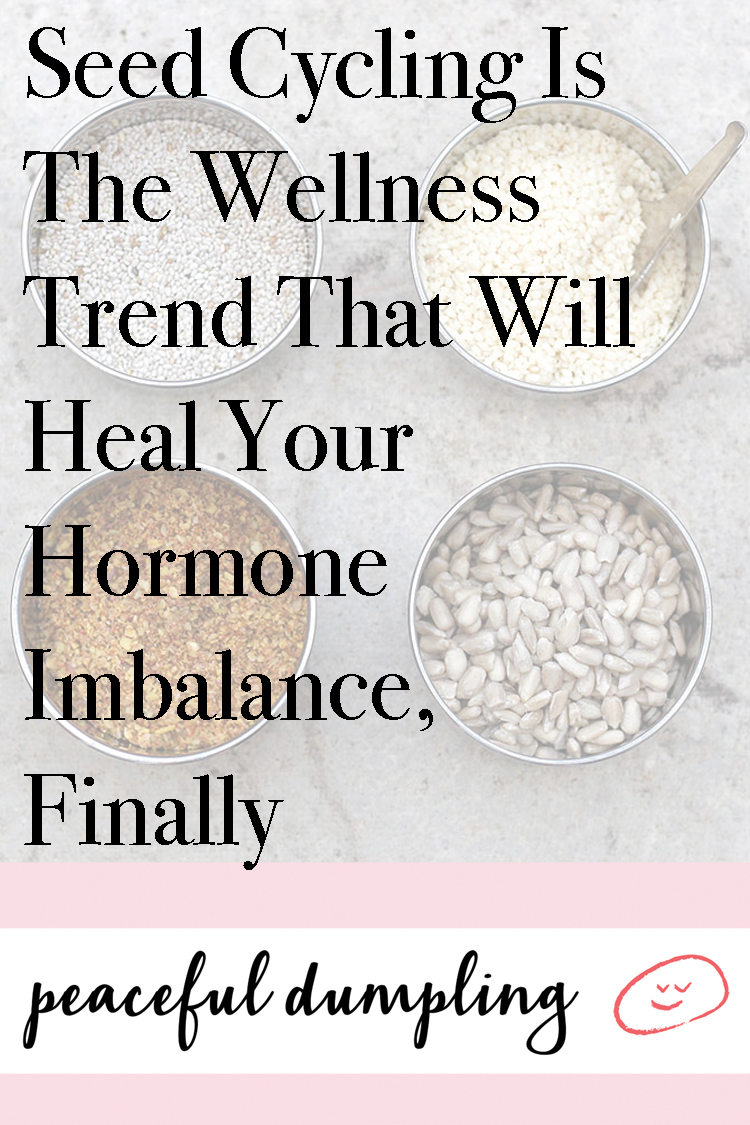Food is everything; particularly when it comes to helping regulate those pesky hormones of ours. You might be suffering the detrimental effects of a hormonal imbalance and if that’s the case, you’ve likely driven yourself nearly insane trying to resolve the problem. But before you collapse into a heap, terrified that you’ve exhausted all resources with little success, let me present to you the relatively little-known technique of seed cycling.

Excess estrogen in the body can lead to a whole host of undesirable effects that many women struggle with from time to time. An estrogen imbalance could be the result of adopting a new type of hormonal birth control. Or, coming off said birth control. It could be stress-related. Or it could be the result of long-term exposure to one or more endocrine disruptors (endocrine system = hormone stuff). These come in the form of various chemicals used in personal care products, pesticides, herbicides, certain plastics, heavy metals and so much more.
You can’t live your life in a bubble, but you can do your best to eliminate these things by reaching for organically-grown, natural products and avoiding culprit plastics wherever possible. And where you are being exposed in a public setting that you disagree with, don’t be afraid to contact your local government representative to express your concern and demand change for the wellbeing of the community. You have a right to complain about a local industry that’s directly affecting your health.
The reason our hormones are so important is because they regulate everything in our bodies, from our growth to our metabolism and – of course – our reproductive cycle. Therefore, it’s important you consider yours and how you can support them. One such way is by adopting the dietary regulation aid of seed cycling.
What is Seed Cycling?
Much as the name would suggest, seed cycling refers to consuming different seeds at different times of the month, depending on where you are in your cycle. Different seeds consist of specific vitamins, nutrients and oils that can support your body in varying ways. The idea of seed cycling is that you give your body what it wants when it wants it.
The combinations used for a healthy menstrual cycle are: flax and pumpkin, followed by sunflower and sesame.
Let’s first look at flax and pumpkin. This combination is used during the body’s follicular phase. This phase takes place from the first day of your period until the time of ovulation (or when the next egg is released). This phase lasts about 15 days, but that’s truly a ballpark figure as all women are different, and your follicular phase might be a good few days shorter or longer than that. Use the signs your body is giving you to determine ovulation. Flax, in particular, contains lignans that mimic estrogen in the body. They are also thought to help mop up excess progesterone. Pumpkin seeds, which are rich in many essential vitamins and minerals as well as omega-3’s, help to boost estrogen levels during this first part of our cycle by providing the necessary building blocks for hormone synthesis.
Post-ovulation, in the luteal phase, the body needs a boost of progesterone until the uterus lining sheds once more. From ovulation until your next period, the focus is on sunflower and sesame. These provide the building blocks to produce progesterone and help mop up excess estrogen where it’s no longer needing to play such an important role. Keeping progesterone levels topped up will help to encourage your next period in a timely fashion, keeping your cycle regular and giving you peace of mind.
How to Seed Cycle
Add one tablespoon of freshly ground seeds of the appropriate type to your daily diet and watch it become a habit that you hardly give any thought to after a month or two. Rinse and repeat.
An easy way to remember which seeds are consumed when is with the following:
Now, all of the above depends upon you consuming the seeds correctly and having a good awareness of your cycle. If you’re not quite there yet, here are six tips:
1. Download an app which allows you to track your cycle. Kindara and Flo are two great places to start.
2. Ensure seeds are ground prior to consumption. Freshly ground is best, otherwise grind enough for the week and store in an air-tight container.
3. Take care of your liver. Seed cycling is no miracle cure and should be viewed as an additional puzzle piece of your health journey rather than a panacea. Make sure you’re keeping your blood sugar levels in check.
4. Add seeds to anything and everything, from smoothies to energy balls and bars, to soups and salads.
5. Buy organic wherever possible to minimize your intake of potential endocrine-disrupting chemicals.
6. Minimize stress. When we’re chronically stressed, the cortisol our bodies produce (another hormone) blocks our progesterone receptors and thus limits the role that progesterone can play. This perturbs our cycle which further increases stress levels because we wonder when our period is going to arrive!
The moment we choose to become active – as opposed to passive – consumers, we choose to play a vital role in how our bodies function. That decision to take responsibility for our own health allows us to heal ourselves of any ailments and live our best lives. There’s nothing to lose by dipping a toe in and seeing how it goes.

Have you ever tried seed cycling?
Also by Kat: Acne, PMS, Weight Gain? 3 Ways Diet Can Heal You From Estrogen Gone Awry
Related: Don’t Toss Your Pumpkin Seeds! 6 Reasons They’re A Superfood & How To Use Them
Exhaustion, Low Libido? Exactly How to Workout to Help Your Hormones
Get more like this–sign up for our newsletter for exclusive inspirational content!
__
Photo: Kat Kennedy
